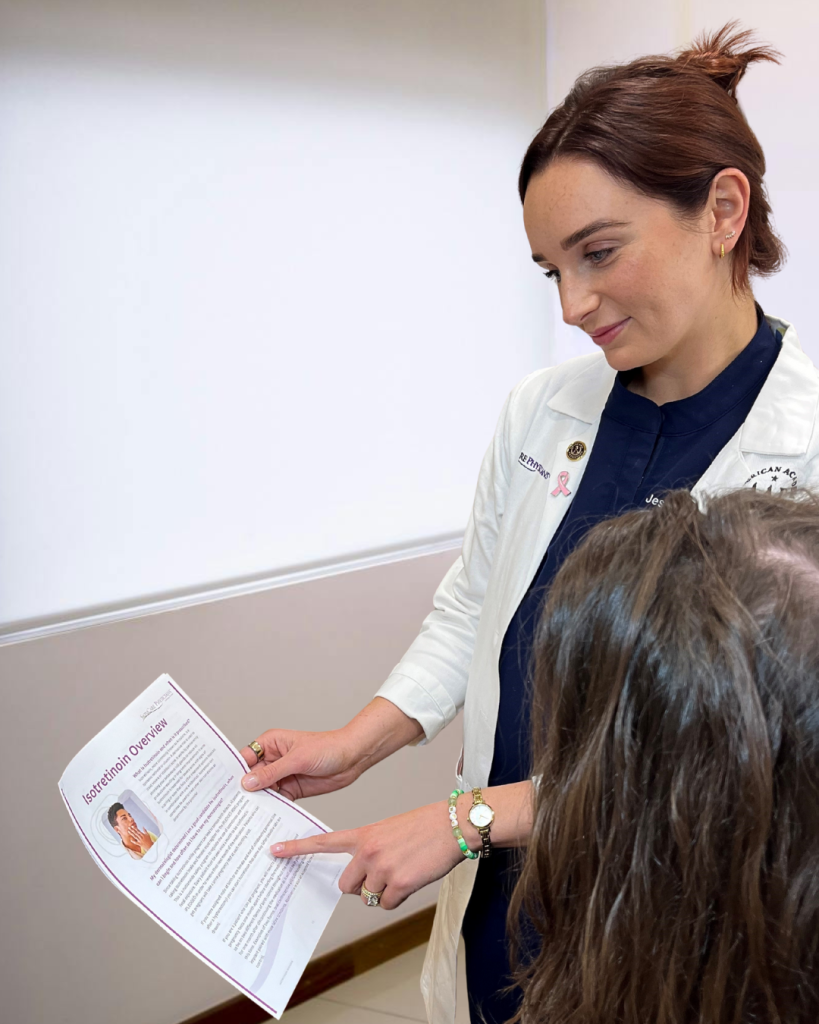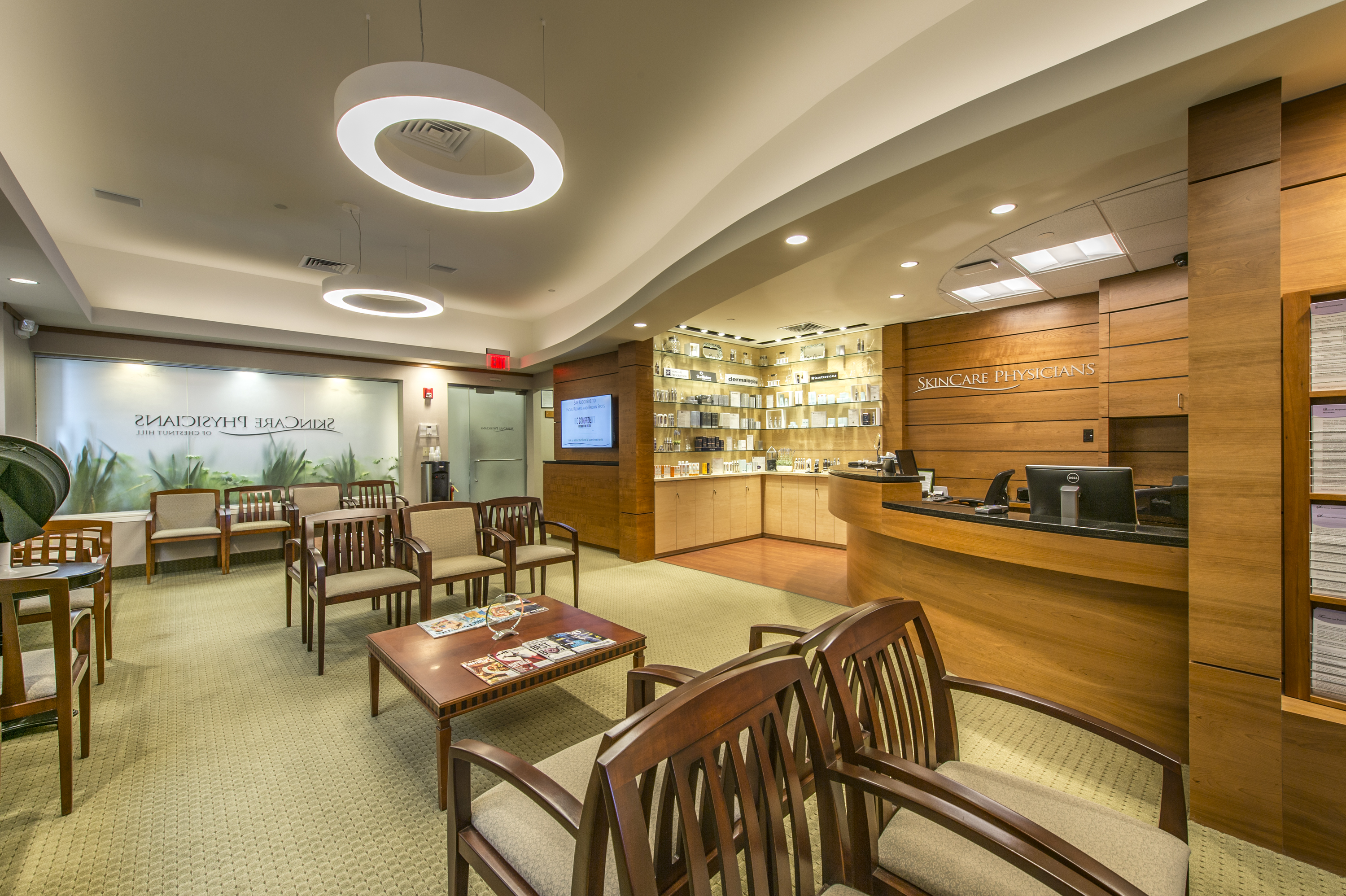A Nurse Practitioner’s Experience with Isotretinoin: What you need to know
 When I was in my early twenties, I battled a severe and stubborn case of acne. I had dealt with acne since my teens, but this was different. I noticed some improvement with a combination of topicals and oral antibiotics, but I was still breaking out and I was worried about permanent scarring. It was more than just a skin issue; it affected my confidence and even my willingness to socialize with friends. After trialing other therapies for a few months, my dermatologist recommended isotretinoin, more commonly known as Accutane. I was nervous after reading about the treatment, but it ended up being life-changing for me. Now, as a nurse practitioner, I often walk patients through the journey I took years ago.
When I was in my early twenties, I battled a severe and stubborn case of acne. I had dealt with acne since my teens, but this was different. I noticed some improvement with a combination of topicals and oral antibiotics, but I was still breaking out and I was worried about permanent scarring. It was more than just a skin issue; it affected my confidence and even my willingness to socialize with friends. After trialing other therapies for a few months, my dermatologist recommended isotretinoin, more commonly known as Accutane. I was nervous after reading about the treatment, but it ended up being life-changing for me. Now, as a nurse practitioner, I often walk patients through the journey I took years ago.
Whether you’re considering isotretinoin for yourself or just want to understand what it involves, here’s an overview of what to expect, based on both my professional knowledge and my personal experience.
What is isotretinoin and when is it prescribed?
Isotretinoin is a powerful retinoid or vitamin A derivative that works by permanently shrinking your sebaceous (oil) glands, reducing oil production and resulting in long-term improvement in acne. It is reserved for severe acne, especially when there is scarring or when other treatment options (topical creams combined with oral antibiotics) have failed. Occasionally, Isotretinoin is used to treat other skin conditions, at the provider’s discretion.
How soon can you start Isotretinoin and how often will you see your dermatologist?
Because isotretinoin can cause serious birth defects if taken during pregnancy, all patients (male and female) must enroll in the iPLEDGE® REMS program. This is a nationwide safety program that regulates the use of isotretinoin to minimize fetal exposure. You will need to see your provider once a month to be confirmed in iPLEDGEÒ and receive your refills. Additionally, if you can get pregnant, you will have to take a urine pregnancy test at each monthly visit.
- For patients assigned male at birth or females not of childbearing potential (e.g., after a hysterectomy): You can start isotretinoin that same day after your baseline labs.
- For patients who can get pregnant: You will need two negative pregnancy tests one month apart before starting. You will be required to use two forms of birth control throughout the treatment and for one month afterward as the medication will remain in your system. Accepted forms of birth control include oral contraceptive pill, IUD, NuvaRing, hormonal implant, male latex condoms and abstinence.
What will your treatment dosage and duration be?
Your provider will calculate your isotretinoin dose based on your weight at your initial visit. Typically, the first month starts at half of your recommended maintenance dose to minimize side effects, then it is increased sometimes gradually but often times it is doubled that second month.
On average people complete their course in about 6 months, however your treatment could be longer or slightly shorter depending on your acne severity and response to therapy.
When can you expect to see results?
Some lucky patients see improvement in their acne the first month of treatment, but for most, noticeable changes come by the end of month three.
What are the side effects of isotretinoin?
- Birth defects can be very serious if take while pregnant.
- Increased acne flare, referred to as “the purge”, can occur the first month of treatment and more commonly with very severe acne. To lower this risk, our providers start patients on a low dose.
- Dryness of the lips, eyes, mouth, nose, and skin is expected.
- Higher photosensitivity or sun sensitivity can result in blistering sunburns if not diligent with sun protection.
- Joint and muscle aches, usually mild and well-managed with daily stretching, increased hydration, and a daily fish oil supplement.
- Other potential side effects include but are not limited to mood changes, decreased night vision, headaches, fatigue. I ask my patients to inform me when they are experiencing any of these other side effects.
How often will you need lab work?
Because Isotretinoin has the potential to increase triglycerides and liver enzymes (ALT/AST), you will most likely have your labs drawn twice. Once as a baseline before starting the medication, and once after your second or third month of treatment to make sure you are tolerating your dose.
Can you drink alcohol while taking isotretinoin?
No, it is strongly recommended that you avoid alcohol completely. Isotretinoin and alcohol are both processed through the liver. Taken together, they will increase your risk of pancreatitis and liver damage.
Can you take other medications while on isotretinoin?
Your provider will go over your medication history to ensure all your current medications are compatible. But you should skip:
- Any medications processed through your liver, such as Tylenol
- Any supplements containing vitamin A
Also, you should discontinue all active topicals previously used to treat your acne.
Helpful supplements you can take during treatment
While there are a lot of don’ts while using isotretinoin, here are some supplements we recommend.
- Antihistamines: Some providers advise taking a daily antihistamine (such as Zyrtec). Some studies show that antihistamine can help lower the risk and severity of the initial purge and may also speed up the improvement in acne lesions, all while decreasing the severity of some side effects.
- Fish Oil with Omega 3: A daily dose of at least 1g fish oil may help decrease side effects such as dryness and joint aches, aid isotretinoin absorption, and lower triglyceride levels.
- Healthy fats: Avocado, olive oil, nuts, seeds, and fatty fish taken with your dose help increase absorption and efficacy of the medication.
When is the best time to start isotretinoin?
Technically, you can start isotretinoin any time of year as long as you are very diligent with sun protection. Ideally, I like to start my patients in the fall to avoid peak sun season as the photosensitivity from isotretinoin is very intense. The sun is also not kind to acne scarring, another reason to avoid the sun!
For teens, it is ideal to finish the treatment course before going off to college as ongoing monthly visits can pose a challenge.
My personal favorite products while on isotretinoin
From my personal and professional experiences, here is the list of products I like to share with my patients before they start their isotretinoin journey.
- 32-40 oz water bottle: To ensure they keep well hydrated which is extremely important
- Lips: Aquaphor lip protectant w/ SPF 30, Vaseline, Dr. Dan’s Cortibalm, EltaMD UV Lip Balm
- Face cleanser & moisturizer: Cetaphil Gentle Skin Cleanser (normal to dry skin), La Roche-Posay Toleriane Double Repair Face Moisturizer
- SPF: EltaMD UV Clear SPF46 (on face no matter the season), La Roche-Posay Anthelios Melt-in Milk Sunscreen SPF 60 (on top of hands year-round and body when exposed to the sun)
- Daily body moisturizer: La Roche-Posay Lipikar AP+M Triple Repair Body Moisturizing Cream, CeraVe moisturizing cream (in jar)
- For dry eyes/nose: Systane lubricating eye drops (avoid redness relief eyedrops like Visine), saline nasal spray, Aquaphor for nostrils, and humidifier for sleeping
- Extras when in the sun: Wide-brimmed hat, sunglasses, umbrella, and UPF protective clothing
Looking back, starting isotretinoin was one of the best decisions I made for my skin and my self-esteem. The treatment required commitment and diligence, but it gave me lasting results that topical creams never could. I understand the psychological impact acne can have and I love helping patients gain their confidence back, it truly is life-changing. The journey can be challenging at times, but the end goal is worth it. If you suffer from severe acne, book an appointment with me or one of my colleagues to see if you are a good candidate for isotretinoin.



Leave a Reply